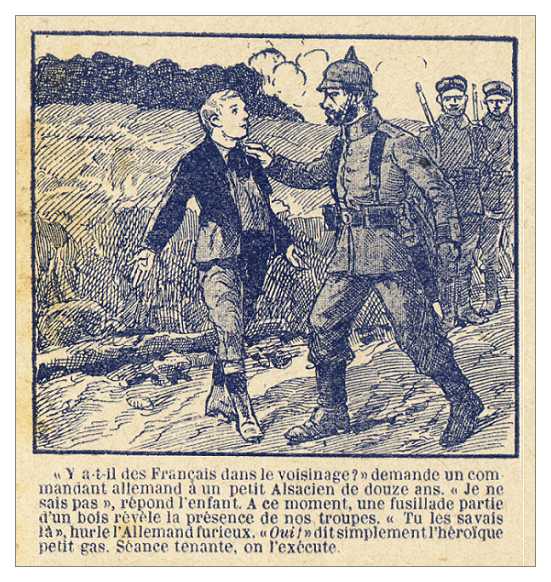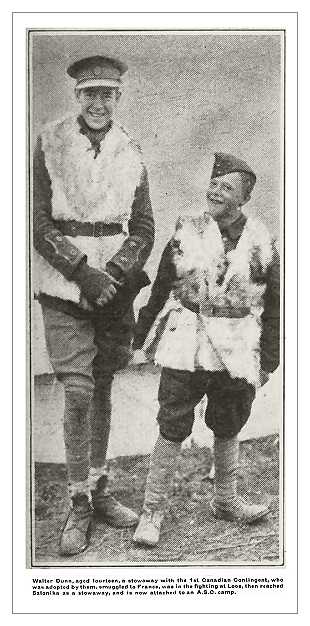
from the British boy's magazine
Young England
1915 - 1916

Stories from a British Boy's Magazine

A FRENCH BOY SCOUT
WHEN the war broke out, Yves Meval was at Morlaix, where he belonged to the local contingent of Boy Scouts, and had just passed an examination admitting him. to serve as a hospital and ambulance attendant.
He was then only sixteen years old. . His imagination fired by the stories told by the wounded soldiers in the hospital to which he was attached, and his eldest brother having loft for the front in the meantime, young Meval decided that he, too, would go to the war.
One evening in September he succeeded in getting away with a company of the 72nd Infantry, and en September 25th he reached Sainte Menehould.
The next day the boy managed to procure a uniform and a rifle, and bravely took his place in the trenches with the other soldiers of the regiment. Meval went through the whole of the, first Argonne campaign.
At the beginning of February he was wounded, first in the leg, then by a shell-splinter, which cost him his right eye, and finally by an explosive bullet in the arm.
He was nursed in the hospital at Chalons-sur-Marne, and has had the honour of being "mentioned in the Order of the Day " by his Lieutenant, Major, Colonel, and General. It was in the presence of 200 Boy Scouts in Paris recently that Major do Belleville pinned the coveted Military Cross on the boy hero's breast.

from a French news magazine 'Le Miroir' : adolescent soldiers
BOY HEROES 0F THE PRESENT WAR
By A. TERNIER
In days to come, when the tremendous conflict in Europe is ended, and its history is written, some of the most stirring and appealing chapters will be those dealing with the heroic deeds of boy soldiers.
In all the nations engaging in hostilities, Youth has girded on his Father's sword. In the histories of the American Civil War there is handed down to fame :
Little Giffen of Tennessee; Eighteenth battle, and he sixteen.
In this war there are yet younger heroes.
One of Russia's most valiant generals, Ivanoff, has stated that he is proud to have, under him the youngest soldier under arms, in all the hostilities. Nicholas Neslidanoff is only thirteen, and is now attached as despatch rider to the famous general's personal staff as a reward for his bravery. He has fought in nine battles, and is the proud possessor of a decoration presented to him by the Tzar for his exceptional bravery.
Another Russian -boy has been decorated with the very much coveted and most discriminatingly granted Cross of Saint George, for his very cool and deliberate bravery when acting by himself and on his own initiative.
He, Alexis Chervatkin, when with a reconnoitring party became separated from them and discovered the dead body of a standard-bearer, who had fallen that evening, the colours of his regiment beside, him. Chervatkin, having cut away the colours from their staff, wrapped them round his body, arranging his uniform so as to hide them. He continued to creep towards the enemy's position, but was captured, only to escape half an hour later, and make his way toward his own lins. While creeping, past a sleeping company of German soldiers, he marked a standard-bearer lying with the flag at his side,. Stealthily cutting off the colours he bundled them up, and gained his own trenches, though by this time, badly wounded.
Again the Serbians sing the praises of their boy hero, Dragoljub Jelletitich, who, although only little more than thirteen, was duly promoted to the, rank of corporal for his exceptional bravery, after the Serbian Minister of War had drawn up a special decree placing him in the regular forces.
France echoed with the exploits of Georges Franzetti of Mentone, aged thirteen and a half, who ran away from home, and, making for Paris, managed to slip into the ranks of a regiment as it was on the point of leaving for the terrible Vosges front. A sergeant got a rifle and a uniform f or him.
Georges' conduct at the front was heroic. He took part in the battles of Champenoux and Crevie, and in the, formidable conflict round the Ste. Marie Farm He caught a bullet in one eye, and a shell splinter in the right arm. Now he is in hospital, and is one-eyed; but the much-treasured Croix de Guerre hangs above his bed.
Another French boy, Yves Meval, has also been decorated with the Croix de Guerre for his behaviour under fire.
Among the German and Austrian troops several youths have been promoted to lieutenantships at the ages of sixteen and seventeen, notably Ober-Lieutenant Heinrich von Frelherr, for his steadfast bravery in the Argonne entrenchments.
But with the British, youngsters in the actual fighting front are sternly discouraged and kept back, though as regards the Royal Navy, youth is on a different footing. No better illustration of the. fine spirit of daring and iron devotion to duty animating Britain's sea forces is as yet to hand than the exploits of seventeen midshipmen who have been awarded decorations for their work at the Dardanelles. Two of these have received the Victoria Cross.
The one, Midshipman G. L. Drewry, Royal Naval Reserve, assisted in getting the troops ashore under heavy rifle and Maxim-gun fire. Wounded in the head, he continued his work, and twice subsequently tried to swim from troopboat to troopboat, to pass a hawser. The other, Midshipman W. St. A. Malleson, Royal Navy, who is only sixteen, assisted Drewry and his commander to pass the line connecting the troop-boats. After Drewry's failure through exhaustion, Malleson succeeded, swimming with the hawser attached to a lighter line, which was hauled on board. The, line broke later on, and again and again Malleson tried anew manfully to, accomplish his self-imposed t,ask.
There is nothing more heroic and impressive than the way in which youths, who can truthfully be termed schoolboys yet, have played the part of men in their nat~ion's hour of need. They face and accept all that modern warfare offers just as grandly as the men.
Just as the above article was being read for press the following interesting announcement appeared in the newspapers :
The Military Cross has been awarded to 2nd Lieut. Frank Hudson, The Buffs and RFC for conspicuous gallantry and skill on several occasions, notably when, although severely wounded in the head, he successfully completed his aerial reconnaissance. After re-crossing the line and landing at an aerodrome, he at once lost consciousness. This young officer is only 18 years of age, hut has many times driven off enemy machines and twice forced them to descend.

photo from a British news magazine